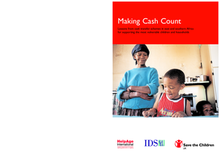This study was conducted as part of a UNICEF-commissioned review of social protection measures reaching the increasing numbers of vulnerable children in east and southern Africa. The components completed in 2005 looked at three types of social protection interventions: cash transfers, public works programmes and measures that ensure access and retention for educationally marginalised children. Save the Children UK and HelpAge International (HAI) were commissioned to carry out the unconditional cash transfer component of this review.
This study reviews unconditional cash transfers in 15 countries of east and southern Africa, examines four programmes in more depth (in Ethiopia, Lesotho, Mozambique and Zambia), and draws lessons for policy from this comparative review. The methodology is qualitative; this report does not provide a quantitative analysis of these programmes. Since unconditional cash transfers are a relatively new policy instrument in Africa, several knowledge gaps exist. Specifically, rigorous impact assessments, comparative cost-benefit analyses (e.g. of cash transfers versus food aid and other in-kind transfers), and monitoring of intra-household spending patterns (especially by gender), are lacking and are urgently needed.
©Save the Children UK, HelpAge International and Institute of Development Studies

